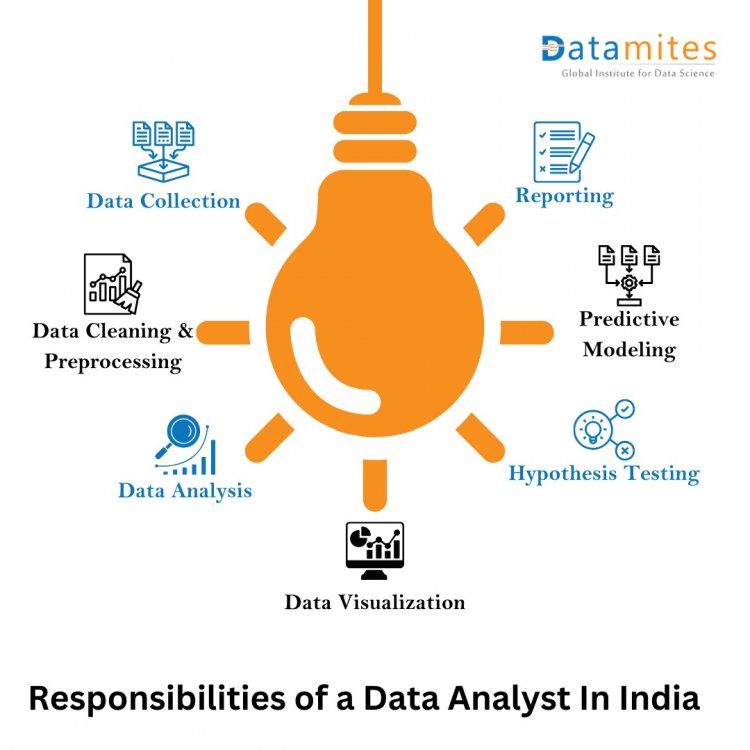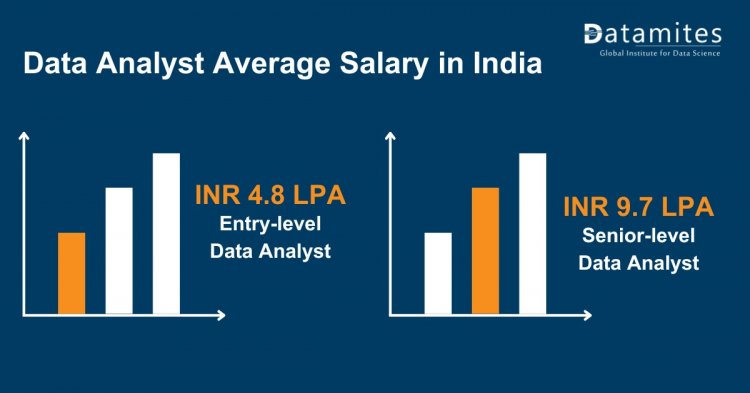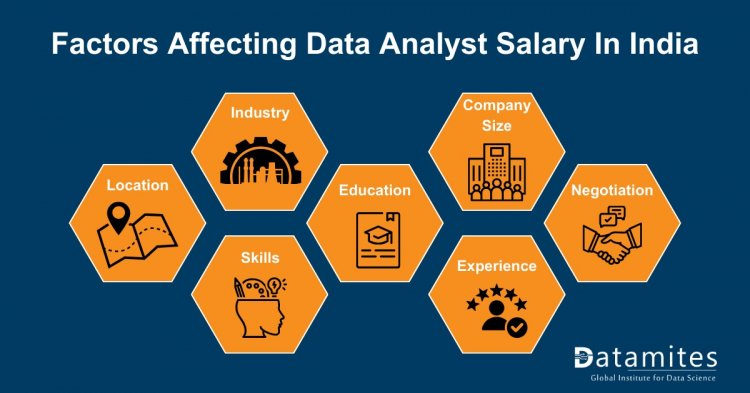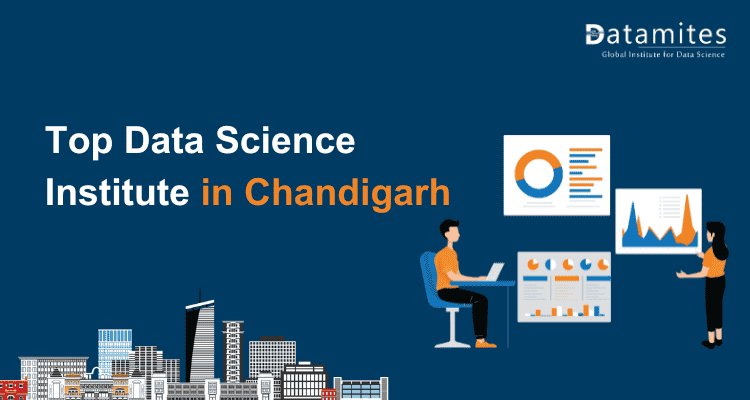Data Analyst Career Scope in India

Data analysis has emerged as a promising career path in India, offering numerous opportunities for individuals with a penchant for crunching numbers and extracting valuable insights.
In 2022, the global data analytics market reached an estimated value of $49.03 billion. Grand View Research forecasts a substantial compound annual growth rate (CAGR) of 26.7% between 2023 and 2030
In this article, we will explore the dynamic scope of a data analyst career in India, including job prospects, skills required, salary expectations, and the evolving landscape of this field.
Demystifying Data Analytics: Unlocking the Power of Data for Informed Decision-Making
Data analytics involves examining, cleaning, and interpreting data to extract meaningful insights. It uses statistical and computational techniques to uncover trends, patterns, and relationships in data.
According to the latest NASSCOM report, the Indian Big Data Analytics sector can attain a market worth of USD 16 billion, with an estimated compound annual growth rate (CAGR) of 26% projected from 2019 to 2025.
Data analytics has surged in popularity due to the exponential growth in data volume. It plays a crucial role in various industries, including finance, healthcare, marketing, and technology. Companies use data analytics to make data-driven decisions, optimize processes, enhance customer experiences, and gain a competitive edge. With the continuous generation of data, the scope of data analytics is expanding, creating a high demand for skilled professionals in this field.
Read these articles:
- Global Analysis: Unveiling Data Analyst Job Market and Salaries
- Becoming a Data Analyst: A Step-by-Step Guide
- Roadmap to Success: Navigating a Career in Data Analytics
What does a data analyst do and what are their responsibilities?
A data analyst is a professional who specializes in collecting, processing, analyzing, and interpreting data to derive insights and support decision-making within an organization. Data analysts play a crucial role in helping businesses and institutions make informed choices, optimize processes, and solve complex problems using data-driven approaches. The data analyst’s responsibilities typically include:
- Data Collection: Gather data from various sources, such as databases, spreadsheets, APIs, surveys, and external data providers. Ensure data quality, accuracy, and completeness.
- Data Cleaning and Preprocessing: Clean and preprocess data to remove errors, missing values, and inconsistencies. This stage is pivotal to verify that the data is appropriate for analysis.
- Data Analysis: Use statistical and analytical techniques to explore data, identify patterns, trends, and correlations. Data analysts employ tools like Excel, Python, R, or specialized analytics software for this purpose.
- Data Visualization: Create clear and informative data visualizations, including charts, graphs, dashboards, and reports, to communicate findings effectively to stakeholders.
- Hypothesis Testing: Formulate hypotheses and perform tests to answer specific business questions or investigate the impact of various factors.
- Predictive Modeling: Develop predictive models using machine learning algorithms to make forecasts, recommendations, or identify trends in the data.
- Reporting: Generate regular and ad-hoc reports summarizing key insights, findings, and recommendations. Present results in a way that non-technical stakeholders can understand.

What is the Demand for Data Analysts in India?
The demand for data analysts in India is robust across various sectors, including healthcare, retail, finance, and telecommunications, each with its unique perspective:
- Healthcare: In the healthcare sector, data analysts are in high demand to analyze patient records, medical data, and clinical trials. They assist in improving patient care, predicting disease outbreaks, and optimizing hospital operations. The demand is driven by the need for evidence-based decisions and regulatory compliance.
- Retail: In the retail industry, data analysts help businesses understand customer behaviour, preferences, and shopping patterns. They analyze sales data, inventory levels, and market trends to optimize pricing, inventory management, and marketing strategies, ultimately enhancing the customer shopping experience.
- Finance: The financial sector relies heavily on data analysts to assess market trends, manage risk, and make investment decisions. These professionals analyze financial data, detect fraud, and develop algorithms for algorithmic trading, contributing to the sector’s growth and stability.
- Telecommunications: Data analysts are essential in the telecommunications industry for managing vast amounts of network data. They monitor network performance, analyze customer usage patterns, and predict maintenance needs to ensure uninterrupted service quality and enhance network efficiency.
Refer these articles:
- Python Developer Salary in India
- Artificial Intelligence Engineer Salary in India
- Data Scientist Salary in India
What is the career scope of data analytics in India?
The career scope of data analytics in India is quite expansive and promising, driven by the growing digitalization of industries and the increasing reliance on data-driven decision-making across various sectors. According to a report from IndiaAI.Gov.in, the future looks bright for data analyst roles, with an expected growth of 27% over the next ten years. This increasing demand is attributed to the growing amount of data that businesses must manage and their eagerness to utilize this data more efficiently.
Here are some key aspects of the career scope in this field:
Growing Demand Across Industries:
- Data analytics is in high demand across diverse sectors like IT, e-commerce, finance, healthcare, telecommunications, retail, and manufacturing.
- Businesses are increasingly leveraging data analytics for customer insights, operational efficiency, strategic planning, and competitive advantage.
Rising Adoption of Big Data and AI:
- With the rise of big data, artificial intelligence (AI), and machine learning (ML), the demand for professionals skilled in these areas is increasing.
- Data analytics plays a crucial role in the development and implementation of AI and ML models.
Increased Government Initiatives:
- Government initiatives like Digital India and Smart Cities are fostering a data-driven approach in public governance, creating more opportunities for data analysts.
Startups and Innovation:
- India’s growing startup ecosystem, particularly in tech, is a significant driver for analytics roles.
- Startups often rely on data analytics for market research, customer insights, and innovation.
Career Advancements and Specializations:
- The field offers diverse career paths, from data analyst to data scientist, data engineer, business analyst, and more.
- There are opportunities for specialization in areas like predictive analytics, business intelligence, and data visualization.
Global Opportunities:
- Skilled data analysts in India are also in demand globally, particularly in industries where data plays a key role in decision-making.
- The ability to work remotely has opened up international opportunities for many professionals.
Competitive Salaries and Growth:
- Data analytics roles often come with competitive salaries and strong growth potential.
- As professionals gain experience and specialize, there is significant potential for salary growth and leadership roles.
What are the Qualifications and Key Skills to become a data analyst in India?
To become a data analyst in India, you typically need a combination of qualifications and key skills:
Qualifications:
Bachelor’s Degree: Most data analyst positions require at least a bachelor’s degree in a related field such as mathematics, statistics, computer science, engineering, economics, or a relevant domain.
Master’s Degree: While not always mandatory, having a master’s degree (e.g., M.Sc. in Data Science or Business Analytics) can provide a competitive edge and deeper knowledge in the field.
Certifications: While not always obligatory, certifications can bolster your credentials and showcase your expertise in particular tools or technologies. Several pertinent data analyst certifications in India encompass:
- IBM Data Analyst Professional Certificate
- NASSCOM Certified Data Analytics Professional
- Microsoft Certified: Data Analyst Associate
- IABAC Certified Data Analyst
- Google Data Analytics Professional Certificate
Key Skills:
Data Analysis Tools: Proficiency in data analysis tools such as Python, R, SQL, and data visualization tools like Tableau or Power BI is essential.
Statistical Analysis: Strong understanding of statistical concepts and techniques for data exploration, hypothesis testing, and predictive modeling.
Data Cleaning and Preprocessing: Ability to clean and preprocess data, handling missing values, outliers, and ensuring data quality.
Data Visualization: Skill in creating meaningful visualizations to communicate insights effectively using tools like matplotlib, Seaborn, or ggplot2.
Database Management: Familiarity with database systems and SQL for data retrieval and manipulation.
Machine Learning: Basic knowledge of machine learning algorithms and their applications in data analysis.
Domain Knowledge: Depending on the industry you want to work in (e.g., finance, healthcare, e-commerce), having domain-specific knowledge can be valuable.
Refer the following articles:
- Data Analyst Career Scope in Bangalore
- Data Analyst Career Scope in Pune
- Data Analyst Career Scope in Hyderabad
What are the Salary Trends and Compensation of a Data Analyst in India?
The salary trends and compensation for data analysts in India can vary significantly based on factors such as experience, location, industry, and the specific organization. However, here is a general overview of salary trends:
Entry-Level Data Analyst
The salary of an entry-level data analyst in India ranges from INR 4,80,271 per year according to an Indeed report.
This range can vary depending on the location, with major metropolitan cities offering higher salaries.
Average Data Analyst
The average salary of a data analyst in India ranges from INR 7,50,000 per year according to a Glassdoor report.
This salary depends on specialized skills, industry expertise, and a track record of successful data projects that can lead to higher compensation.
Senior Data Analyst
The salary of a senior data analyst in India ranges from INR 9,69,618 per year according to an Indeed report.
Senior position’s salary involves managerial or team leadership responsibilities, which can contribute to higher compensation.

Factors Affecting Salary:
Location: Salaries are typically higher in major metropolitan areas like Bangalore, Mumbai, Delhi-NCR, and Hyderabad compared to smaller cities or towns.
Industry: Your salary can be substantially influenced by the industry in which you are employed. Finance, e-commerce, and technology tend to offer higher salaries for data analysts.
Skills: Specialized skills such as machine learning, artificial intelligence, and big data analysis can lead to higher compensation.
Education: Having a master’s degree or relevant certifications can boost your earning potential.
Company Size: Larger organizations and multinational IT companies often offer more competitive compensation packages.
Experience: Experience plays a crucial role in determining salary levels, with senior data analysts earning substantially more than entry-level professionals.
Negotiation: Effective negotiation skills can help you secure a better salary package.

Wrap-up:
The data analyst career in India holds great promise and dynamism, thanks to the city’s prominent status as a major technology hub. The persistent growth of the IT and business sectors fuels a rising demand for proficient data analysts. This profession combines both challenging and fulfilling aspects, rendering it a viable and potentially lucrative option for individuals in this field.
DataMites Data Analyst Institute provides a wide range of data analytics courses in India, covering fundamental principles to advanced topics such as artificial intelligence (AI). It serves as an excellent platform for acquiring knowledge and joining a global community of data analysts.
With a steadfast commitment to excellence spanning a decade, DataMites has effectively educated a global network of more than 50,000+ learners. In 2022, it achieved esteemed recognition as one of the top 5 worldwide data science institutes, as awarded by IABAC®. Moreover, DataMites offers a wide range of courses covering Python, Deep Learning, Data Science, Machine Learning, MLOps, Tableau, Data Mining, and various other subjects.





